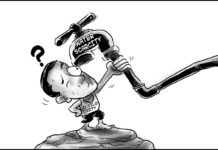
THE PHILIPPINES’ iconic jeepneys, colorful symbols of the nation’s cultural heritage, face an existential threat from the Public Utility Vehicle Modernization Program (PUVMP). This initiative, aimed at improving the country’s transportation system, inadvertently displaces many jeepney operators and drivers. While the government’s effort to modernize is commendable for its environmental and safety benefits, the social and economic impact on those who have long depended on this sector for their livelihood cannot be overlooked.
The PUVMP, a laudable project for its vision to enhance public transport efficiency and reduce carbon emissions, presents a challenging transition for thousands of jeepney operators and drivers. These individuals are not mere employees but custodians of a unique Filipino cultural legacy. The need to modernize public transport while preserving this cultural heritage is a complex but necessary balancing act.
The concerted efforts of various government agencies, including the Department of Labor and Employment (DOLE), the Technical Education and Skills Development Authority (TESDA), and the Department of Transportation (DOTr), are commendable. Programs like “enTSUPERneur” and “Tsuper Iskolar” reflect a holistic approach, addressing immediate financial needs and offering long-term skills development. However, the effectiveness of these programs in truly compensating for the loss of livelihood and cultural displacement remains to be seen.
While the government’s assistance programs are well-intentioned, they may not fully encapsulate the needs of the displaced. For many jeepney operators and drivers, their profession is not just a job but a way of life. The skills training and livelihood assistance, though beneficial, might not equate to the loss of a familiar and culturally significant profession.
The shift to modern transportation systems opens avenues for technological advancement and economic growth. Yet, this progress should not be at the expense of those who have been the backbone of the country’s public transport for decades. The government must ensure that the transition is inclusive and equitable, offering viable alternatives that respect the dignity and legacy of the jeepney culture.
The displacement of jeepney operators and drivers due to the PUVMP is more than a matter of economic change; it is a cultural and social issue that needs sensitive handling. The government’s assistance programs are a positive start, but continuous evaluation and adaptation are necessary to address the evolving needs of those affected. As the Philippines strides towards modernization, it must not forget the individuals and traditions that are part of its rich cultural fabric. The journey ahead should be one of progress, but also of respect, inclusion, and preservation of a cultural legacy that is uniquely Filipino.




